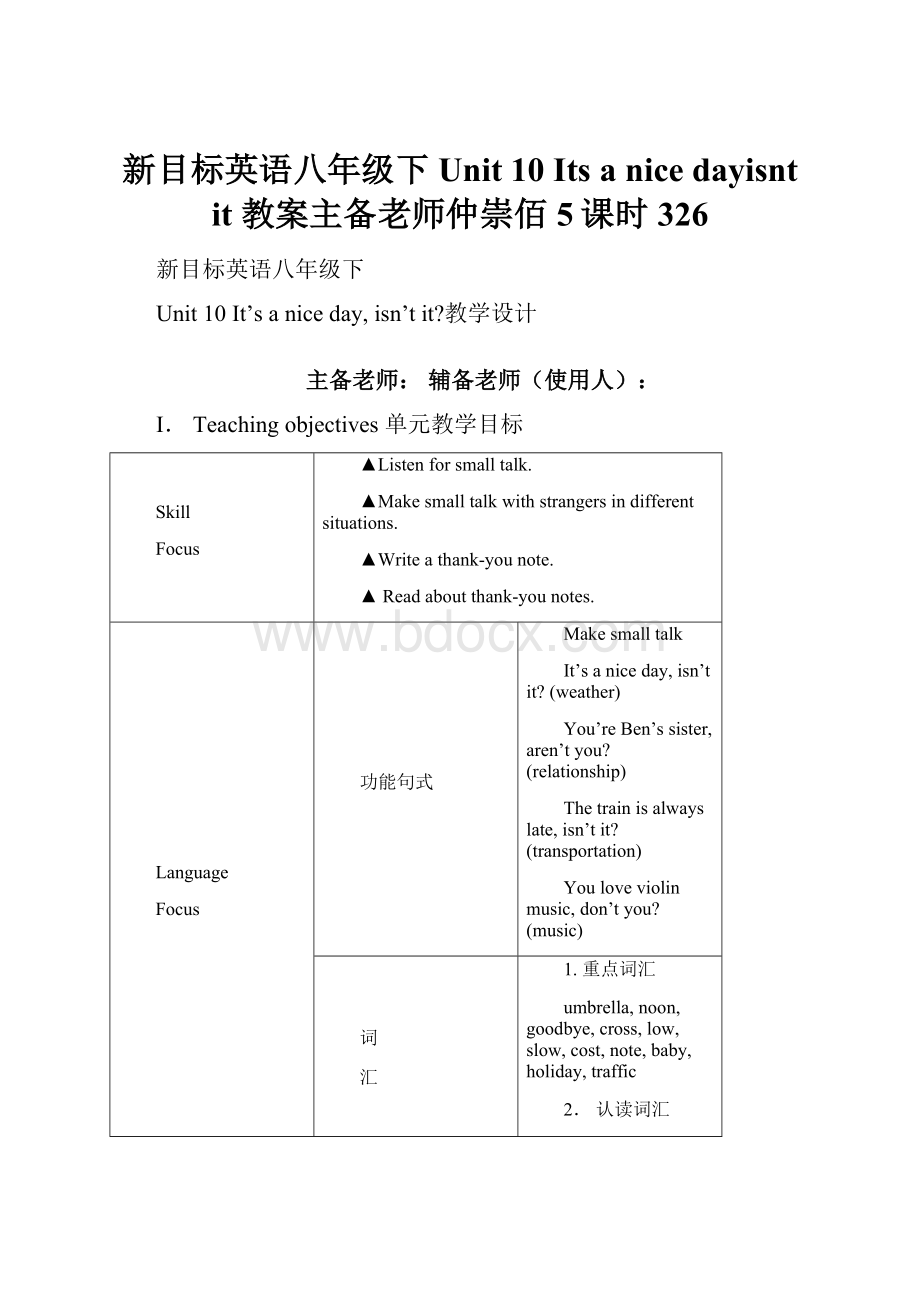新目标英语八年级下Unit 10 Its a nice dayisnt it 教案主备老师仲崇佰5课时326.docx
《新目标英语八年级下Unit 10 Its a nice dayisnt it 教案主备老师仲崇佰5课时326.docx》由会员分享,可在线阅读,更多相关《新目标英语八年级下Unit 10 Its a nice dayisnt it 教案主备老师仲崇佰5课时326.docx(40页珍藏版)》请在冰豆网上搜索。

新目标英语八年级下Unit10Itsanicedayisntit教案主备老师仲崇佰5课时326
新目标英语八年级下
Unit10It’saniceday,isn’tit?
教学设计
主备老师:
辅备老师(使用人):
I.Teachingobjectives单元教学目标
Skill
Focus
▲Listenforsmalltalk.
▲Makesmalltalkwithstrangersindifferentsituations.
▲Writeathank-younote.
▲Readaboutthank-younotes.
Language
Focus
功能句式
Makesmalltalk
It’saniceday,isn’tit?
(weather)
You’reBen’ssister,aren’tyou?
(relationship)
Thetrainisalwayslate,isn’tit?
(transportation)
Youloveviolinmusic,don’tyou?
(music)
词
汇
1.重点词汇
umbrella,noon,goodbye,cross,low,slow,cost,note,baby,holiday,traffic
2.认读词汇
Franklin,sandy,bookstore,elevator,yeah,Erhu,somewhere
3.词组
lookthrough,getalong,atleast,becareful
语
法
Tagquestions
It’saniceday,isn’tit?
Yes,itis.Ireallylovehotweather.
You’reJenny’sFriend,aren’tyou?
Yes,Iam.
Strategy
Focus
Cooperating
Usingwhatyouknow
II.Teachingmaterialsanalyzingandrearranging教材分析和教材重组
1.教材分析
本单元以“Smalltalk"为话题,旨在通过单元教学,帮助学生掌握在什么情况下使用smalltalk以及如何用smalltalk和陌生人交谈,并能辨别什么样的smalltalk是得体的,什么样的是不得体的,进而了解中西方在这方面的文化差异,增强他们在日常生活中的沟通和交流能力;在学生初步掌握了smalltalk的用法后,学习tagquestion的表达法,这也是本单元的语法重点;如何写感谢信是本单元的写作任务,学生将学习如何为不同的主题写感谢信,表达谢意。
SectionA1a介绍什么是smalltalk并让学生根据图片判断什么样的场合会发生smalltalk,由此引入本单元的主题;1b让学生听三段对话录音,根据听到的顺序给图片排续,帮助学生从听力材料中了解、获取目标语言;1c是一个口头会话练习,指导学生如何用目标语言进行对话;2a和2b是两个听力活动,通过听力训练帮助学生进一步了解目标语言的用法,介绍如何将smalltalk进行下去;2c要求学生设想一个在公交车站的smalltalk场景并结对完成对话,是对学生的一种语言输出练习;3a要求学生阅读并补充一段smalltalk对话,是对目标语言的阅读和写作训练;3b要求学生口头练习3a中的对话并和同伴用提供的情景写一段smalltalk对话,然后进行口头练习,是对目标语言的写作和口语训练;4给学生提供了一个应用所学语言的机会,要求他们设想并表演出和一些陌生人之间的smalltalk,帮助学生认识和不同的人应该有不同的smalltalk话题。
SectionB1a让学生判断图片中提供的哪些问题是合适的smalltalk问题,哪些是不合适的,从而进一步了解关于smalltalk的文化含义,即东西方文化差异;1b是在1a基础上的口头训练,强化学生对smalltalk问题合理与否的认识;2a和2b是两个听力练习,要求学生能根据smalltalk的内容辨别其地点并学会对smalltalk作应答;2c又是一个小组口头活动,帮助学生在smalltalk中学习使用正确的Openingquestions;3a一篇有关thank-younote的阅读材料,要求学生根据材料内容判别表示感谢的不同情境,了解什么是感谢信,哪些情况需要写感谢信;3b和3c是感谢信的两个写作训练,即语言输出训练;4设计了一个情景,要求学生运用所学句型设想可能的smalltalk,并进行会话练习,体现了目标语言的功能性。
Selfcheck1要求学生对几个重点词汇进行填空训练,帮助学生在语境中学习、巩固词汇;2要求学生根据图片完成对话,是对学生语言应用能力的综合检验;3也是对目标语言运用的检验,要求学生根据图片所提供的情景作对应的会话练习,把目标语言和真实场景结合起来,培养学生应用语言的能力。
2.教材重组和课时分配
Period1(SectionA:
1a,1b,1c,2a,2b,2c)Function
Period2(SectionB:
1a,1b,2a,2b,2c,SectionA:
3a)Listeningandspeaking
Period3(SectionA:
3b,4,SectionB:
4)
Performanceshow
Period4(SectionB:
3a,3b,3c)Readingandwriting
Period5(Selfcheck)Grammarandpractice
III.Teachingplansforeachperiod
分课时教案
新目标英语八年级下
10It’saniceday,isn’tit?
第1课时Function
Targetlanguage目标语言
1.Wordsandexpressions重点词汇和短语
smalltalk,umbrella,noon,bynoon
2.Keysentences重点句子
Tagquestions:
It’sreallycoldtoday,isn’tit?
TheNo.15busstopshere,doesn’tit?
Abilitygoals能力目标
Getstudentstoknowwheretomakesmalltalk.
Enablestudentstomakesmalltalkusingtagquestions.
Learningabilitygoals学能目标
Helpstudentslearnhowsmalltalkisusedindifferentsituations.
Teachingimportantanddifficultpoints教学重难点
Theuseoftagquestions.
Teachingaids教具准备
Pictures,taperecording.
Teachingproceduresandways教学过程与方式
StepILead-in
T:
Goodmorning,boysandgirls!
Nowlet’srecallsomethingabouttwoyearsago,thefirstdaywhenyoucamehere.Everyonewasnewherethen.Ofcourse,youdidn’tknoweachotheratthattime.Doyoustillrememberthewordsthatyousaidtothestudentyoudidn’tknow?
Whatarethewords?
Ifyoucan’tsaytheminEnglish,ChineseisOK.
S1:
What’syourname?
S2:
Whichschoolareyoufrom?
S3:
You’reChenFei’sclassmate,aren’tyou?
S4:
Howoldareyou?
S5:
Yourpencil-boxisbeautiful,isn’tit?
T:
Well,theconversationbetweenyouandotherpeopleyoudon’tknowiscalled“smalltalk”.InChineseitmeans“闲谈”.
Write“Smalltalk”ontheblackboard.
StepⅡPresentation
T:
Now,let’sthinkaboutwhenwemakesmalltalk.Justnow,wetalkedaboutthefirstdayyoucametoanewschool.That’sanexampleofthesituation.Arethereanyotherplacesinyourlifewhereyouwouldtalktosomepeopleyoudon’tknow?
Whatarethey?
Makealistofthem.
Studentsworkalonetowritedowntheplaces.Whenthey’vefinished,asksomestudentstoreadouttheirlists.
Samplelist:
onabus,waitinamovieline,atabusstoportrainstation,ataconcert,inarestaurant,atapark
T:
Herearefourpictureswhichshowdifferentsituations.Talkaboutthembyaskingtwoquestionsforeachpicture.
Q1:
Whereisit?
Q2:
Whataretheydoing?
Answer:
Picture1:
inaline;waitingtobuymovieticket
Picture2:
atatrainstation;waitingforthetrain
Picture3:
atatrainstation;waitingforthetrain
Picture4:
ataconcert;listeningtothemusic
T:
Wherewouldyoustartaconversation?
Circlethesituationsbelowwhereyouwouldstartaconversation.
S1:
Iwouldstartaconversationatatrainstation.
S2:
Iwouldstartaconversationataconcert.
T:
Asyouknow,smalltalkmaybevariousindifferentsituations.Forexample,atastation,thesmalltalkwillbeaboutthetrain,it’slateorearly,somethinglikethat.However,ataconcert,thesmalltalkwillbeaboutthemusicorthemusicians.
T:
Nowlistentothreeconversationsanddecidewheretheyaremakingsmalltalk.Numberthepicturesin1aintheorderyouhearthem.
Playthetapeforthestudentstolistento.
Checktheanswers.
T:
Listenagain.Thistimelistenforhowtheystarttheirconversations.Trytocatchthefirstsentenceineachconversation.
Askstudentstorepeatthefirstsentenceineachconversation,andthenwritethemdownontheblackboardorshowthemonthescreen.
√He’sreallygood,isn’tit?
√Thislineismovingslowly,isn’tit?
√Thetrainislate,isn’tit?
StepⅢPairwork(1c,P76)
T:
Thesequestionsaretagquestions.Theyarequiteoftenusedtostartsmalltalk.Forexample,inthefirstpicture,theymaymakeaconversationlikethis:
A:
Itlookslikerain,doesn’tit?
B:
Yes,itdoes.AndIforgetmyumbrella.
Drawapictureofanumbrellatoshowitsmeaning.
Readthesentencesforthestudentstofollow.
T:
Canyoumakesmalltalkfortheotherpictures?
Workinpairstomakeyoursmalltalk.Youcanusetheexpressionsbelow.
Thetrainisalwayslate,isn’tit?
Youloveviolinmusic,don’tyou?
Itlookslikerain,doesn’tit?
Callseveralpairstopresenttheirconversations.
Sampleconversations:
Conversation1:
A:
Thetrainisalwayslate,isn’tit?
B:
Yes,itis.Ihopeitcomessoon.
Conversation2:
A:
He’sreallygood,isn’the?
B:
Hesureis.Ioftenlistentohismusic.
A:
Youloveviolinmusic,don’tyou?
B:
Yeah,it’swonderful.
StepⅣListening(2a,2b,P77)
T:
Tohavesuccessfulsmalltalk,bothpeopleneedtoaskquestionstolettheconversationgoon.Listentothethreeconversations.Aretheyexamplesofsuccessfulorunsuccessfulsmalltalk?
Write“S”(forsuccessful)or“U”(forunsuccessful)intheblanksbelow.
Playtherecording.Thenchecktheanswers.
T:
Herearesomesentencesinthesuccessfulconversation.
Callsomestudentstoreadthesentencesin2bseparately.
T:
Let’slistentothesuccessfulconversationagain.Putthesentencesandquestionsbelowinorder.Itbeginswith“f”.It’stheopeningoftheconversation.
Checktheanswers.
Explaintwolanguagepoints:
▲Ihopeso./Ihopenot(negativeform).Theyareusedtoexpressagreementordisagreement.
▲bynoonHere“by”means“notlaterthan;before”.Soitmeans“notlaterthannoon”.
StepⅤPairwork(2c,P77)
1.Roleplaytheconversationin2b.Getstudentstopracticetheconversationin2bandthenasksomepairstoactitout.
2.Makeconversations.
T:
Imagineyouareatabusstop.Makeyourownsmalltalk.Youcanusetheexpressionsintheboxbelow.
Askastudenttoreadthem.
S:
It’sreallycoldtoday,isn’tit?
TheNo.15busstopshere,doesn’tit?
T:
Youcanmakeconversationslikethis:
A:
It’sreallycoldtoday,isn’tit?
B:
Yes,itis.Ihopethebuscomessoon.
Callseveralpairstoshowtheirconversations.
Sampleconversation:
A:
TheNo.15busstopshere,doesn’tit?
B:
Yes,itis.Butitalwayscomeslate.
A:
Iusuallywaitforitforquitealongtime.
B:
Ihopethereisnotrafficjamtoday.
StepⅥHomework
T:
Tostartsmalltalk,properquestionsshouldbeasked.Thatdependsondifferentculture.It’snotthesameindifferentcountries.FindoutthedifferencesinthebeginningofsmalltalkbetweenChinaandwesterncountries.
教后反思:
新目标英语八年级下
Unit10It’saniceday,isn’tit?
第2课时Listeningandspeaking
Targetlanguage目标语言
1.Wordsandexpressions重点词汇和短语
cost,sandy
2.Keysentences重点句子
You’reAnna’sbrother,aren’tyou?
Youlovebaseballgames,don’tyou?
Abilitygoals能力目标
Learnhowtomakesmalltalkpolitelyandsuccessfully.
Learnhowtochoosethetopicsofsmalltalk.
Learningabilitygoals学能目标
Helpstudentslearnhowtomakesmalltalkpolitelyandsuccessfully.
Helpstudentslearnhowtochoosethetopicsofsmalltalk.
Teachingimportantanddifficultpoints教学重难点
Whatispoliteandsuccessfulsmalltalk.
Teachingaids教具准备
CIAorlanternslides;taperecording.
Teachingproceduresandways教学过程与方式
StepⅠRevisionandlead-in
1.Begintheclassbytalkingabouttheweather.
e.g.Lovelyday,isn’tit?
Itlookslikerain,doesn’tit?
Badweather,isn’tit?
Getthestudentstoresponse:
Yes,itis./Sureitis.
2.Checkthehomeworkandleadinthenewperiod.
T:
Yesterday.Werecalledsomequestionsyouusedtotalkwithotherstudentonthefirstdayyoucamehere.Let’slookatthemagain.Wouldyoupleasereadthem?
Showthesentencesonaslideorapieceofppt.page.
What’syourname?
Whichschoolareyoufro